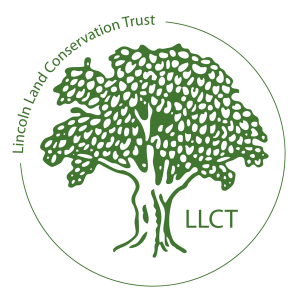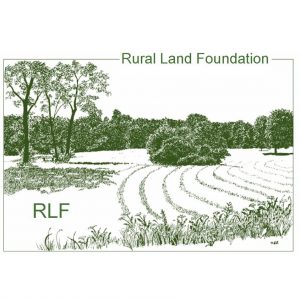Aldo Leopold, influential conservationist and philosopher, pioneered the concept of the “land ethic” in which all members of our ecological community are treated with respect for the mutual benefit of all. For generations, Lincoln residents have embraced this concept by preserving open space for the benefit of all humans, wildlife, and plants. This is now known as Lincoln’s Land Ethic, and the resulting effect has motivated our community’s efforts to preserve open space and Lincoln’s rural character.Residents like you help to create and maintain Lincoln’s special character by preserving open fields, forest, wetlands and agricultural land, and providing trail connections, recreational opportunities, wildlife corridors and critical habitat. You have an opportunity to permanently protect your land and Lincoln’s natural heritage as a legacy for your children and future generations.
LLCT and RLF have worked with generations of Lincoln landowners to craft conservation plans that address personal financial goals, family needs, and conservation vision. LLCT and RLF staff can provide instructive analysis, experienced understanding of land conservation options and practices, and a patient presence through an important and significant decision-making process.
Contact us with questions and to take the next step toward conserving your land.
Options
Conservation Restrictions
A conservation restriction (CR) is a voluntary, legally binding agreement that permanently protects a specific parcel(s) of land. A CR protects the conservation values of the land while allowing the landowner to retain ownership of the land. LLCT holds the CR, which means that we are responsible for making sure that the terms of the CR are upheld, even if the land is sold to a new owner. LLCT currently holds 88 CRs covering more than 560 acres.
Ownership and maintenance
CRs maintain private ownership. The landowner continues to live on and use the property, and the CR is unaffected, even if the property changes hands. The landowner is often better equipped to maintain and care for the land than a public or non-profit entity and can continue to do so as directed by the CR.
Custom conditions
CRs are flexible and written to meet the landowner’s conservation goals. CRs can permit agriculture and other limited uses, as long as the conservation values of the land are preserved. Depending on the level of public access that the landowner agrees upon, some CRs allow hiking on designated trails. Although public access is not required of a CR, it is encouraged.
You select the location
The CR may cover part or all of a parcel, depending upon the conservation values being protected. Generally, existing buildings on the land are excluded from the restriction. If a CR does encompass a building, the CR often allows for reconstruction within the same building footprint.
Requirements
CRs must preserve the land for one or more of the following purposes:
- recreation by and/or education for the general public;
- natural habitat for wildlife, fish and plants, or similar ecosystems;
- water quality and/or watershed protection;
- open space, including farmland and forest land for scenic enjoyment by the general public; and
- historically important land or structures.
LLCT is here to help
LLCT assists landowners with the CR application process, which requires approval from the Conservation Commission, Selectmen, and the State. This process helps ensure that the CR benefits the Town and the general public. Although there is no application fee, many landowners consult their own legal counsel before finalizing a CR.
A long-lasting relationship
LLCT is legally required to uphold the terms of the CRs. As part of its responsibilities, LLCT monitors each CR annually to ensure that the terms of the CR are being met and to address any questions that a landowner may have concerning the CR. LLCT is eager to maintain strong relationships with landowners and is always available as a resource.
Agricultural Restrictions
An agricultural preservation restriction or APR is a special type of conservation restriction that is a legal restriction prohibiting non-agricultural use or development of a parcel in order to preserve the land for agricultural purposes. This state program is voluntary and offers to pay owners of farmland a percentage of the difference between the “fair market value” and the “agricultural value” of their farmland in exchange for a permanent deed restriction.
Deeded Land
Deeding your land to LLCT or RLF is the simplest way to conserve your land. Under certain circumstances, RLF purchases land. As added protection, LLCT will often place a CR on the land to ensure its permanent protection. LLCT and RLF currently hold 77 conservation deeds covering more than 500 acres.
Tax Incentives
There can be significant tax benefits for donating your land, donating a conservation restriction, or selling at a price that is below market value to the RLF. Many factors determine the type and amount of tax benefits you can qualify for; thus, LLCT and RLF recommend that all landowners consult with an experienced attorney or qualified tax advisor before conserving your land.
Conservation Restrictions
Under the Federal Conservation Tax Deduction benefit, donation of a CR may qualify as a charitable tax deduction on a donor’s federal income tax return based on the change in value of the property before and after the CR is implemented. Federal legislation allows deductions for a qualified conservation contribution to be up to 50 percent of Adjusted Gross Income (100 percent for qualifying ranchers and farmers), and carried-forward for a period of 15 years. CRs may also result in a reduction in property and estate tax burdens.
Deeded Land
Donating land outright to LLCT and RLF may qualify as a charitable tax deduction on a donor’s federal income tax return and may even be deductible under the special rules for a qualified conservation contribution. It also eliminates the donor’s future property taxes and removes the value of the property from the donor’s estate, thus potentially reducing estate taxes. The donor can also avoid capital gains taxes associated with selling highly appreciated property. Finally, deeding your land may help avoid Chapter 61 rollback taxes where applicable.
Trail Easements
Lincoln has more than 80 miles of trails, many on privately-owned land that is protected by a trail easement held by the LLCT or the Town. Lincoln landowners who grant trail easements contribute significantly to the enjoyment of a rural lifestyle in a suburban setting. Lincoln’s trail network is appreciated by recreational users, dog walkers, birders, naturalists, conservationists, artists, and people of many interests, ages and backgrounds.
Parameters
Establishing a trail easement is one of the simplest ways to act on conservation values and is defined by the following:
- Legally enforceable agreement between a landowner, and any future owners, and the holder of the trail easement (e.g. LLCT or Town of Lincoln).
- Protection for a landowner from liability for personal injuries or property damage sustained by the public while on a trail on their land.
- Promise of permanent public access through a landowner’s property in the form of a trail. Trail easements can also provide access through private land to a body of water (e.g. a canoe landing).
- Broad or restricted in scope; for example, it may limit types of use.
LLCT and RLF thank everyone with a trail easement on their property for their generosity and for enabling enjoyment of the trails by all.
Conservation Stories
Conservation is a collaborative effort. When land is conserved in any capacity (deeded, restricted, or other), RLF may work with any combination of stakeholders – landowners, neighbors, Lincoln’s Conservation Commission, local land trusts, and state and federal agencies. Together, we preserve and protect Lincoln’s rural character for the benefit of all. There are many wonderful stories and each property is special.
Wheeler Farm
Codman Land
Battle Road Farm
The Wang Property Project at 100 Bedford Road
The Wang Property Project is an innovative private-public partnership to invest in Lincoln’s future. This 16-acre project enhances both Lincoln’s conservation values and provides opportunities for Lincoln’s youth. Nine acres are in process of being deeded to the Town of Lincoln and to the LLCT for conservation land, enhancing watershed protection and trail connections. Three acres are in process of being deeded to the Town for a new athletic field, and the remaining four acres have been purchased by Birches School to expand their nature-based, micro school.
Project Background
In the summer of 2016, the Rural Land Foundation began to explore the purchase of the 16-acre Wang property, located at 100 Bedford Road. A public-private partnership was formed, providing a unique solution to three different needs.
A new athletic field had long been identified as a Town need, and three acres were allocated to the Parks and Recreation Department to accommodate the increased demand of organized sports. The existing fields, deteriorating due to overuse, will begin to recover as play shifts to the new field.
The nine acres purchased for conservation purposes will connect to existing conservation land and trails. This land is also being made available as a “swap” for the proposed solar panel field planned at the Transfer Station.
Benefits of Collaboration
The partnership with the Birches School provides the Town with access to the site from Bedford Road, the use of the parking lot (built and maintained by Birches School), and access to restroom facilities for athletic events.
Core Values of Conservation and Sustainability
Lincoln has long been known for its commitment and leadership in the areas of conservation and sustainability. The nine acres of conservation land will protect adjacent critical watershed lands, eliminate future development of this prime real estate, create a conservation land swap option for a solar field at the Transfer Station, and provide important trail connections to Flint’s Pond conservation area.
A Once-in-a-Generation Opportunity
The last time Lincoln added to its Park and Recreation inventory was nearly half a century ago when the Ballfield Road Campus was completed. Since then, organized sports have become a popular after school activity, with soccer emerging as the leading sport in Lincoln.
While welcomed and encouraged, this has put new stresses on the fields with more than 150 hours of use weekly by more than 600 unique users. The result: dangerous playing conditions characterized by significant topsoil loss, uneven surface areas, and a preponderance of weeds. The new fields will give the Ballfield Road Campus fields time to recover and will accommodate the growth of organized afterschool sports.
The Adams Property Conservation Project
In Thoreau’s Woods and Yours: A Prime Parcel and Public Trail for Preservation
With the generosity of more than 30 neighbors and funds from the RLF, the LLCT, the Community Preservation Act, Walden Woods Project, and Ogden Codman Trust, 3.7 acres of woodland and an important connecting trail were conserved in 2019-2020.
Two properties totaling 13.8 acres lie in the heart of Thoreau’s Walden Woods: one 10 acre parcel had already been conserved, and the second 3.7 acres was being offered by Doug and Trish Adams at significantly below the appraised value.
The now conserved area lies between Baker Farm Road and Granville Road. A frequented walking trail provides an extensive connection among the Flint’s Pond, East Codman, Baker Bridge, Pine Hill, and Walden Pond areas. A corridor for wildlife, such as pileated woodpeckers, red foxes and mink, extends from Adams Woods and the Baker Bridge Fields to the Flint’s Pond conservation land. Undeveloped upland forest, an open field, and wetlands abut a spring-fed pond and grove of beech trees visited regularly by Henry David Thoreau.
This conservation project saved an important trail and a lovely parcel of land. Together, the neighborhood and the wider community were able to conserve, preserve, and protect this land in Thoreau’s woods and yours.
For archival purposes, you can access the campaign page and see the project materials here.


